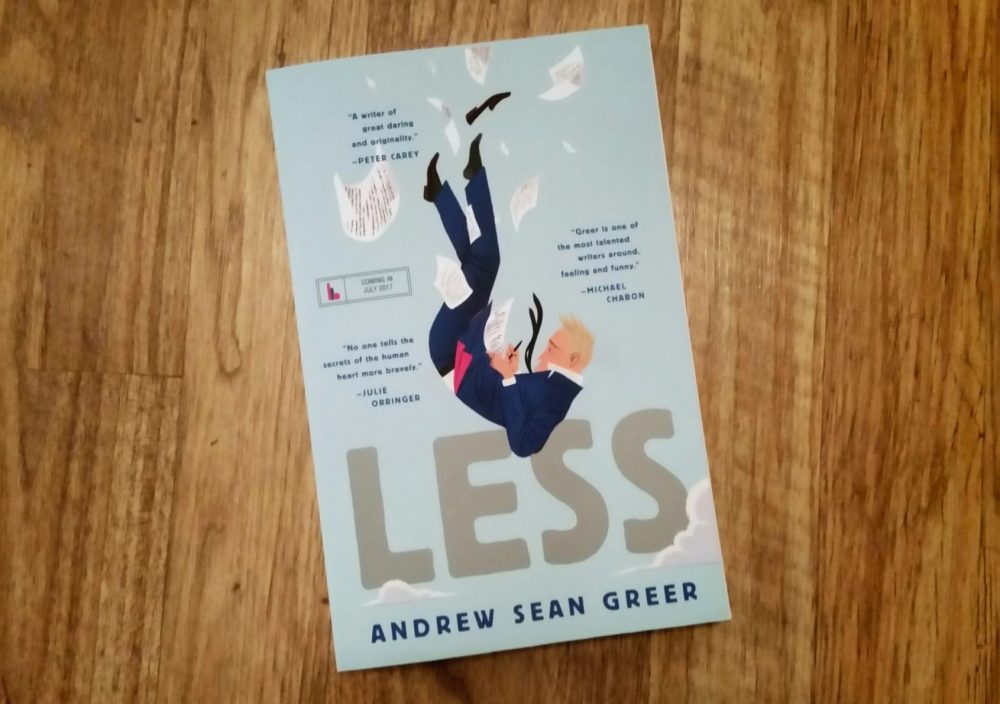Advertisement
Andrew Sean Greer Travels The Worn Road Of Self-Discovery With New Eyes

How far would you go to avoid a dreadfully painful social situation, specifically, the wedding of your former boyfriend to someone else? Would you feign illness? Manufacture a previous commitment?
Such humdrum excuses will not do for Arthur Less, the emotionally tattered hero of Andrew Sean Greer’s "Less." Arthur and Freddy had been together for nine years; the guest list will be laden with mutual friends and acquaintances. His RSVP with regrets must be both stylish and unimpeachable.
Arthur Less is a mid-level author, "one who never sits next to anyone on a plane who has heard of his books," and is just a few months shy of 50, "too old to be fresh and too young to be rediscovered." Nonetheless, he regularly receives invitations to speak at literary conferences, to attend awards ceremonies and to guest lecture at universities. These usually pile up, forgotten, but now Less transforms them into the key ingredients of a literary world tour, a shaping fantasy born of desperation and airy nothing that commences in New York and ranges through Mexico, Italy, Germany, Morocco, India and Japan.
This is a much-trod fictional road, but Greer manages to keep the story fresh.
The novel combines comic picaresque qualities with a cure-by-geography theme: in new locales, Less may find new ideas to breathe more life into his current novel-in-progress. In a country far from his home in San Francisco, he may also find a satisfyingly memorable way to mark his 50th birthday. This is a much-trod fictional road, but Greer manages to keep the story fresh.
Entering the uncharted terrain of his new decade is especially dizzying for Less. In his 20s and 30s, he had been the younger lover of an older, famous (“genius”) poet. Then he was the older partner in his relationship with Freddy. His travels to multiple countries, where his role constantly shifts, provides significant opportunities for Less to re-examine his life and for us to see him from different, often revelatory, perspectives.

The startling triumphs and near-miss disasters that accumulate from one country to the next are told by an unnamed narrator (revealed at story’s end) who is tenderly sympathetic about Arthur’s bruised heart and his frequently bumbling ways. Greer, author of five previous novels, including the award-winning “The Confessions of Max Tivoli,” has honed a narrative mode for "Less" that is an enjoyable convergence of old-style dear-reader storytelling and sharply funny commentary.
For all his insecurities, both personal and professional, people seem to genuinely like Less, and perceive qualities in him that they would like to see in themselves. When he’s thrown into a situation that is way outside his skill set, like when he teaches a college literature course for which he has no background (further hampered by an entertainingly shaky grasp of the German language), the outcome is remarkably positive. Though more grounded in the real world than a character like Nelson Bighetti (“Big Head”) of the HBO show “Silicon Valley” or Chance the Gardener of the 1979 movie “Being There,” Less is similarly gifted with an aura that somehow enables people to absorb whatever emotional or intellectual spark they need from him.
Greer does a fine sendup of the sniping competitiveness that can blossom at literary cocktail parties and dinners. Although, “in a world where most people read one book a year,” where “there is a lot of money hoping that this is the book,” how could there not be peevishness?
Each country offers a very different and well-defined cast of characters, and kudos to Greer for keeping Arthur Less so consistently himself from one place to the next. It’s like listening to a steady singing voice amid a very busy backing track. You’re happy to be in the controlled chaos because it’s all identifiable as part of one larger, cohesive story.
It would be hard write a review of this book without mentioning the choice of Arthur’s last name. The name “Less” gives Greer more than a few openings to play with the definition of less, explicitly and implicitly. The explicit puns wear thin, but the implicit ideas give rise to some shrewd life questions. Can you live happily with less, emotionally? Is the definition of less a decluttering or a diminution? Is living with less, in general, contentment or resignation?
Greer, and Less, show an admirable love of words: their power, their quirkiness and especially how even the most basic words, in the right combination, can ache of everyday travails.
Greer, and Less, show an admirable love of words: their power, their quirkiness and especially how even the most basic words, in the right combination, can ache of everyday travails.
Like many a fulfilling journey, this story’s ending circles nicely back to the beginning. The novel’s opening line is “From where I sit, the story of Arthur Less is not so bad.” It’s a story defined by a lot of human frailty and a good amount of luck. For Less, they may also create a healing way home.
Author Andrew Sean Greer will be at the Harvard Book Store on Friday, July 21, in conversation with Daphne Kalotay.